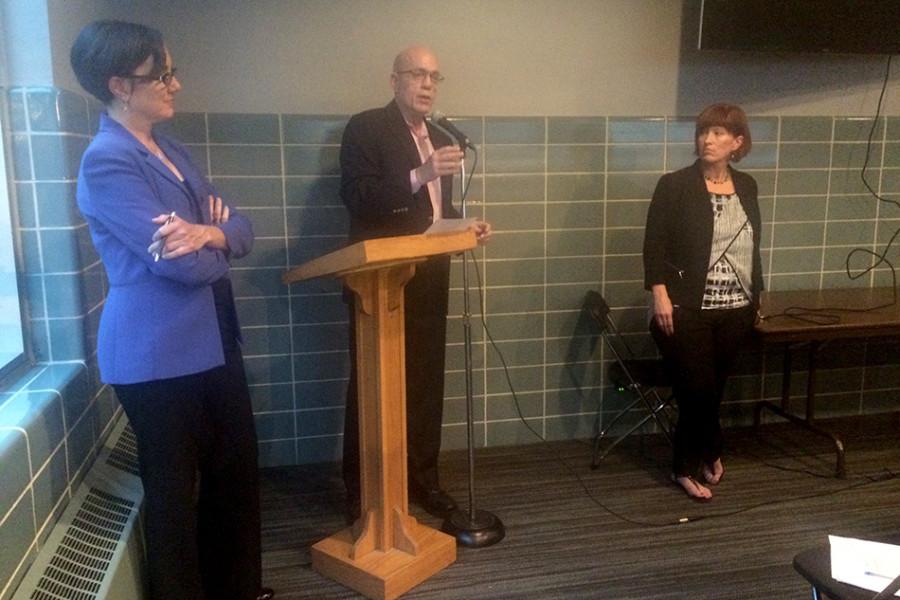State politicians respond to budget concerns in Chicago town hall
Julia Jacobs/Daily Senior Staffer
(From left to right) Rep. Kelly Cassidy (D-Chicago), Rep. Greg Harris (D-Chicago) and state Sen. Heather Steans (D-Chicago) answer questions from an audience of about 80 at Wednesday’s town hall meeting on the Illinois state budget.
June 25, 2015
Three of Illinois’ leading budget-makers braced their constituents at a town hall meeting Wednesday in Chicago for coming action — or lack thereof — on the state’s budget crisis.
State Sen. Heather Steans (D-Chicago), Rep. Greg Harris (D-Chicago) and Rep. Kelly Cassidy (D-Chicago) discussed potential versions of the budget Gov. Bruce Rauner might pass and the consequences on the state service providers if he passes none at all before an audience of about 80 people at St. Andrew’s Greek Orthodox Church, 5649 N. Sheridan Rd.
With the end of the fiscal year one week away, Rauner signed Wednesday the first of 21 budget bills currently on his desk, Harris said. Although Rauner approved the education bill, which provides funding for elementary and secondary education, the rest can still be vetoed, he said.
“This is very uncharted territory,” Harris told the audience. “We’ve never really been in a situation like this in the state of Illinois, where the governor’s proposal and the General Assembly’s passed budgets are so far different.”
One difference between the two budgets is funding for higher education, with Rauner asking for about 31 percent in cuts to public institutions and the General Assembly passing a 6 percent cut.
Despite the potential for reduced cuts, the effects on higher education institutions will remain deep, said Stephen Engelmann, a political science professor at the University of Illinois-Chicago who attended the meeting. There are few new hires in political science at UIC, and the department is forced to seek federal dollars to maintain research opportunities, Engelmann said.
“It’s very hard to maintain quality in the face of these cuts, and it can’t be maintained forever without privatizing things,” Engelmann told The Daily.
The biggest gap between the governor’s budget and the one legislators passed is in pension funding, with legislators designating about $2.2 billion more for pensions than Rauner proposed.
Steans said the growth of pension and debt service is what’s driving the state’s budget challenges, as it has risen from 6 percent of the fiscal year 2006 general revenue fund budget to almost 25 percent in the legislator’s budget proposal for the next fiscal year.
“That means that spending on everything else has gone down dramatically,” Steans said. “Spending on education, spending on human services … all the other items keep going down on how we can spend on them because a much bigger part of our budget is being taken up by the pensions.”
Despite the need to expedite the budget-making process, Rauner remained devoted to passing the items on his “turnaround agenda” late into the session even though they have no impact on the budget, Cassidy said. Legislators found themselves focused toward the end of May on items like right-to-work, a property tax freeze and term limits, she said.
“The time for substantive legislation was at the beginning of the session,” Cassidy said. “Now it’s time to pass a budget and we’re still being held hostage by these (issues).”
The governor decided to act on the state’s budget deficit in April, however, by eliminating the spending for the balance of the year by suspending several human services programs, a move termed the “Good Friday massacre” because it took place the day before Easter, Harris said.
Kelly Anne Ohde, who attended the meeting, works with one of the human services organizations that received a letter in early April telling them to discontinue services. Ohde, director of communications for Easter Seals Metropolitan Chicago, said the nonprofit was forced to shut down its autism programs for a short period of time before finding a new source of private funding.
“We really had no transition plan or preparation for the clients that we serve,” Ohde told The Daily. “It was unethical, it was a challenge and, quite honestly, it was uncalled for at that time in the fiscal year.”
Although their state funding was later reinstated, the organization is waiting to be informed on July 1 whether or not it will be able to continue many of its programs, Ohde said.
If the state doesn’t have a budget by the beginning of next month, the governor’s office will mail out letters notifying providers whether or not they will continue to receive funding, Harris said. Although essential operations like the prison system and state police will continue to receive support, many organizations will have to go to court to prove people’s lives or safety depend on its services in order to stay running, he added.
“There’s a lot of unknowns at this point,” Harris said. “And there will be a lot of chaos if we do not come to a budget agreement in a fairly short order.”
Email: juliajacobs2018@u.northwestern.edu
Twitter: @juliarebeccaj



